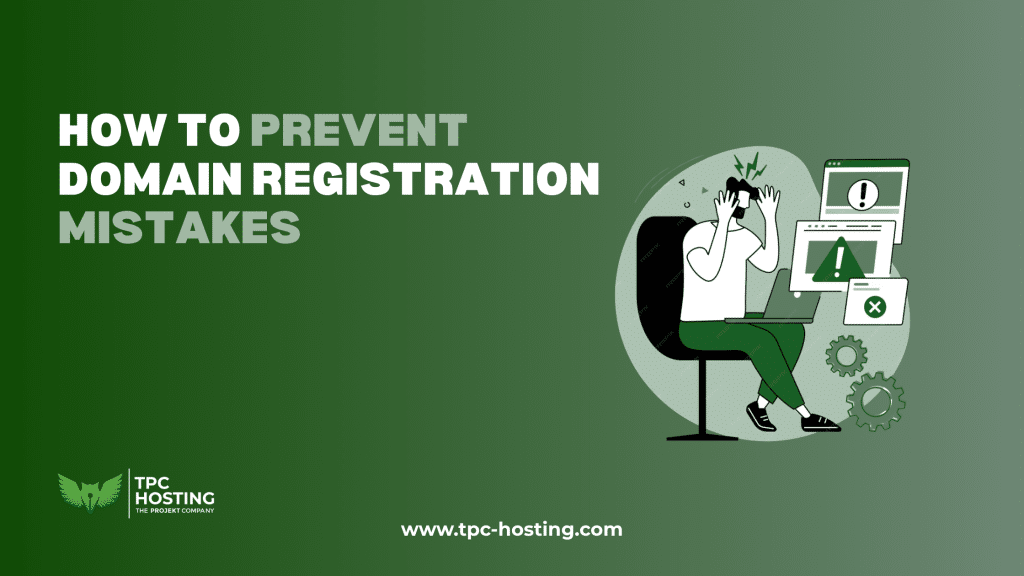
Domain Registration for Businesses
Securing the right domain name is one of the most important steps in building an online presence. For many businesses, it’s the very first move toward creating brand visibility, digital credibility, and customer trust. Yet, despite its significance, domain registration is often treated as a quick administrative task rather than a strategic decision. The result? Costly mistakes that can affect branding, SEO, customer trust, and even revenue.
In today’s digital economy, where your domain name often acts as the front door to your business, avoiding these mistakes is critical. Let’s explore the most common pitfalls businesses make during domain registration—and how to prevent them.
1. Choosing a Complicated or Unclear Domain Name
The mistake:
Businesses sometimes choose long, complex, or confusing domain names in an attempt to be unique. For example, combining multiple words, inserting unusual spellings, or relying on hyphens may seem creative—but they’re often difficult for customers to remember or type correctly.
The risk:
- Potential customers may land on competitors’ websites due to misspellings.
- Complex names can reduce trust and credibility.
- Hard-to-pronounce names are less likely to spread by word of mouth.
The fix:
Keep your domain short, clear, and aligned with your brand identity. A name that passes the “radio test” (easy to say, easy to spell, easy to remember when heard aloud) is usually a safe bet. If your exact business name isn’t available, consider close, professional variations rather than over-complicated alternatives.
2. Ignoring the Importance of Domain Extensions
The mistake:
Many businesses assume that a .com domain is the only viable choice and overlook the wide variety of modern domain extensions—such as .tech, .store, .io, or even country-specific TLDs like .in or .de.
The risk:
- You may miss out on industry-specific extensions that enhance branding.
- Competitors can register alternate extensions and confuse your customers.
- International expansion becomes harder without country-specific domains.
The fix:
Research available domain extensions relevant to your business. For global growth, secure both a primary .com and relevant local TLDs. For niche industries, explore newer extensions that resonate with your audience (e.g., .ai for tech startups, .shop for e-commerce).
3. Overlooking Domain Security and Privacy
The mistake:
Some businesses register domains without enabling privacy protection (WHOIS protection) or adding security features like DNSSEC. This leaves personal or business details exposed.
The risk:
- Your contact information can be publicly accessible, leading to spam, phishing attempts, or even domain hijacking.
- Without proper security, your domain may be vulnerable to unauthorized changes.
The fix:
Always choose a registrar that provides domain privacy options and robust security measures. Enable two-factor authentication, lock your domain to prevent unauthorized transfers, and consider DNSSEC for added protection.
4. Failing to Register Multiple Variations
The mistake:
Registering only one version of a domain and ignoring common misspellings, plural forms, or hyphenated versions.
The risk:
- Competitors or opportunists can purchase similar domains, redirecting your potential customers.
- Customers typing a slightly wrong version of your domain end up elsewhere.
- Your brand identity becomes fragmented.
The fix:
Secure variations of your domain name—including common typos, plural/singular versions, and key extensions. Redirect them all to your primary domain to capture maximum traffic.
5. Using Trademarked Names Without Research
The mistake:
Businesses sometimes rush to register domains that include popular brand names, slogans, or trademarks without proper research.
The risk:
- You may face legal action, fines, or forced surrender of the domain.
- Your brand reputation could take a hit for appearing unprofessional.
The fix:
Before registering, always search trademark databases in relevant jurisdictions. Make sure your chosen domain is legally clear and unique. This avoids disputes and protects your brand from unnecessary complications.
6. Forgetting to Renew Domains on Time
The mistake:
A surprisingly common issue—businesses let their domains expire due to missed reminders or outdated payment details.
The risk:
- Competitors, resellers, or domain squatters can purchase your expired domain.
- Losing your primary domain can damage SEO, email functionality, and customer trust.
- Reclaiming an expired domain can be expensive or impossible.
The fix:
Set domains to auto-renew and keep your payment information updated. Monitor renewal dates closely, and register domains for multiple years to reduce the risk of accidental expiration.
7. Registering Domains Without a Long-Term Strategy
The mistake:
Businesses sometimes register a domain based only on immediate needs, without considering future growth, rebranding, or geographic expansion.
The risk:
- Rebranding later becomes more expensive and confusing.
- International growth is restricted without securing relevant domains early.
- Competitors can claim extensions you may need later.
The fix:
Think long-term. If you plan to expand into new markets or product categories, secure those domain names now. It’s easier—and cheaper—to reserve them in advance than to negotiate for them later.
8. Neglecting SEO Considerations in Domain Registration
The mistake:
Some businesses pick domains without considering SEO value. For example, overly generic domains, domains stuffed with keywords, or irrelevant extensions may harm search rankings.
The risk:
- Poor search visibility, making it harder for customers to find you.
- Google may view keyword-stuffed domains as spammy.
- Lost opportunities to align branding with search intent.
The fix:
Choose a domain that balances branding and SEO. A short, memorable domain that reflects your business is better than a keyword-heavy one. Over time, consistent branding and content will strengthen your search presence more than forced keywords.
9. Choosing the Wrong Registrar
The mistake:
Registering your domain with untrusted or unreliable registrars that offer low prices but poor service.
The risk:
- Hidden fees, complicated transfer policies, or lack of transparency.
- Weak customer support during technical issues.
- Security vulnerabilities and loss of control over your domain.
The fix:
Always register your domain with a reputable, accredited registrar. Look for transparent pricing, strong security features, responsive customer support, and easy domain management tools.
Where TPC Hosting fits in:
This is where choosing a trusted partner makes all the difference. TPC Hosting provides secure, transparent, and professional domain registration services designed to meet the needs of modern businesses. From domain privacy protection and DNS security to straightforward management dashboards, TPC Hosting ensures you don’t just register a domain—you secure a long-term digital asset with the right safeguards in place.
10. Treating Domain Registration as a One-Time Task
The mistake:
Businesses often assume domain registration is a “set and forget” task. In reality, it’s part of an ongoing digital strategy.
The risk:
- Ignoring updates in domain policies and regulations.
- Failing to integrate domain management into overall IT and branding strategies.
- Missing opportunities to protect and expand your digital footprint.
The fix:
Regularly review your domain portfolio, security settings, and renewal schedules. As your business evolves, adapt your domain strategy to align with your goals.
Final Thoughts
Your domain name is more than a web address—it’s a digital asset that represents your brand, builds trust, and drives visibility. By avoiding these common mistakes, businesses can secure stronger branding, reduce risks, and create a foundation for long-term growth.
Domain registration may seem simple, but treating it strategically ensures your business stays protected, competitive, and credible in an increasingly digital marketplace.









